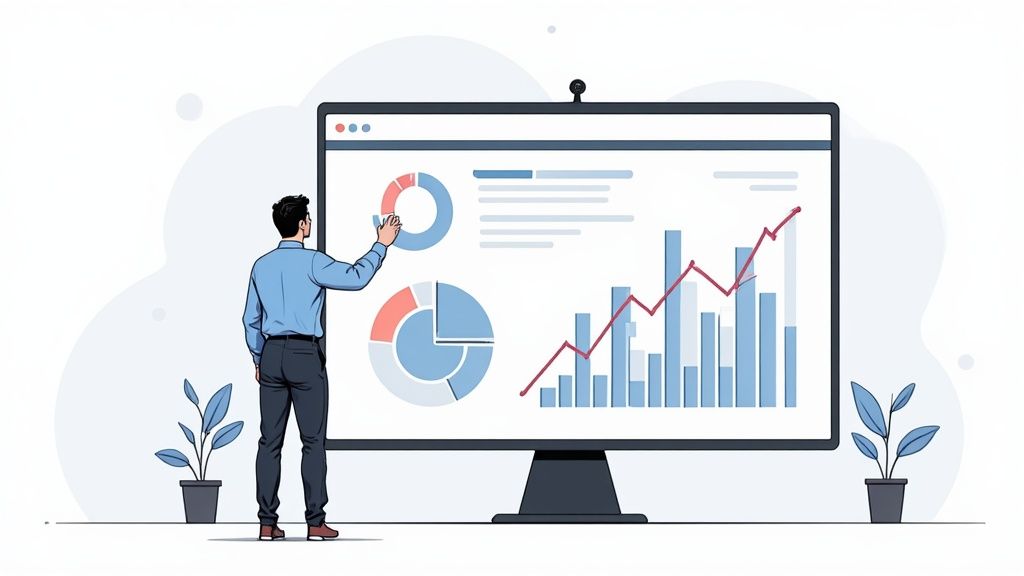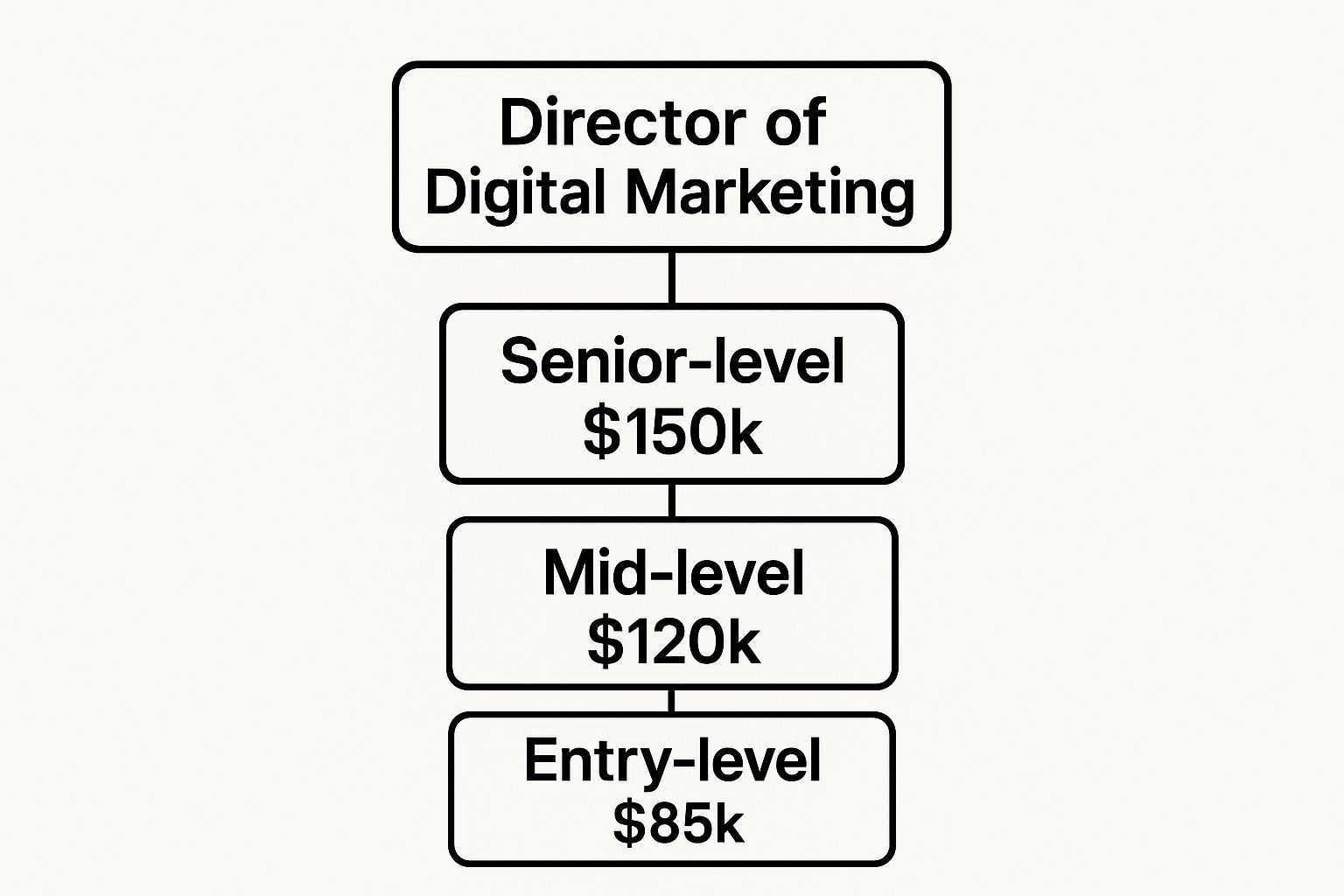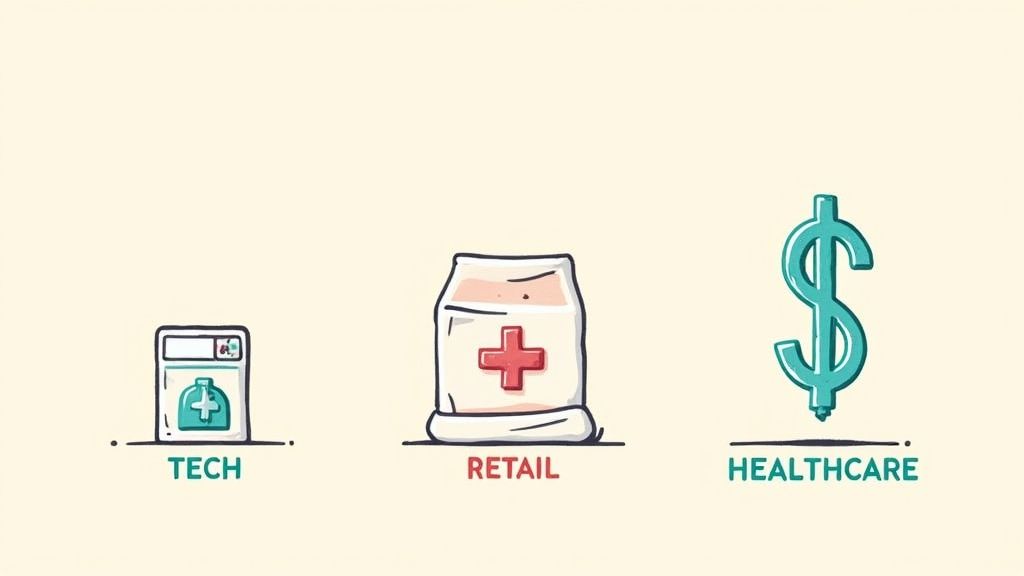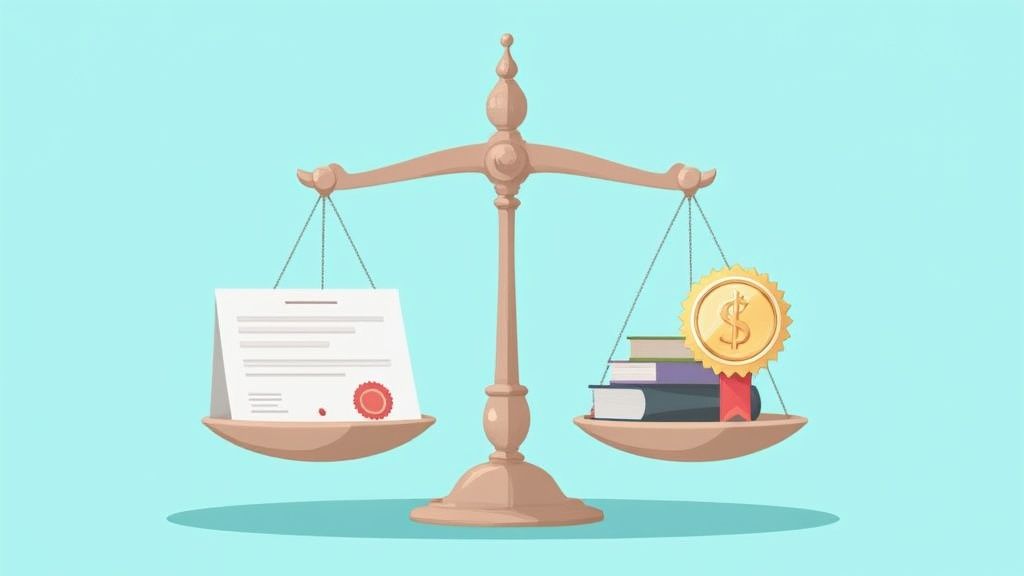
Director of Digital Marketing Salary Guide
Published
When you see a job posting for a Director of Digital Marketing, the salary can seem all over the map. On average, the role pulls in around $123,000 per year, but that's just a starting point. The reality is a wide spectrum, with salaries often starting at $86,500 and climbing well past $150,000 for top-tier talent.
This big gap isn't random—it's driven by your experience, where you live, and the kind of company you work for.
What Is a Typical Director of Digital Marketing Salary?

Trying to nail down a single, definitive salary for a Director of Digital Marketing is like trying to hit a moving target. The numbers are constantly shifting based on a whole host of factors. But by digging into the national averages and salary percentiles, we can get a really clear picture of what you can expect to earn.
Think of salary less as one number and more as a range. Where you fall on that range depends entirely on your specific skills, background, and circumstances.
Let's ground this in some hard numbers. As of mid-2025, the average salary for a Director of Digital Marketing in the U.S. hovers around $123,711 per year, or roughly $59.48 an hour. What's truly telling, though, is the full range reported by sources like ZipRecruiter, which can stretch from a modest $34,000 to an impressive $246,500 annually. This massive spread shows just how much room there is to grow financially in this career.
Understanding Salary Percentiles
Averages give you a baseline, but percentiles tell the real story of what people are actually earning. They break down the salary distribution across the market, giving you a much better sense of where you might land.
Here’s what those percentiles mean in practical terms:
- The 25th Percentile: At $86,500, this is often the territory for directors who are newer to the role, working in smaller cities, or leading teams at startups or smaller businesses.
- The 50th Percentile (Median): This is the middle ground. Half of the directors in the market earn more than this figure, and half earn less. It’s the true "typical" salary.
- The 75th Percentile: Reaching $150,000 usually means you have significant, proven experience, highly sought-after specialized skills, or work for a major corporation in a high-cost-of-living area.
That difference of over $63,500 between the 25th and 75th percentiles is huge. It signals that there are very real opportunities to substantially boost your income as you build your expertise and take on more responsibility.
To help you visualize these benchmarks, here’s a quick summary of the key salary figures.
Director of Digital Marketing Salary Benchmarks
| Metric | Annual Salary |
|---|---|
| National Average | $123,711 |
| 25th Percentile | $86,500 |
| 50th Percentile (Median) | $123,711 |
| 75th Percentile | $150,000 |
| Top 10% Earners | $207,000+ |
This data gives you a solid framework for understanding your earning potential. It’s not just about having the "Director" title; it’s about the context surrounding it. For a wider view of how this role's pay compares to others in the field, check out our complete digital marketing salary guide.
The expansive salary range for a Director of Digital Marketing underscores a key truth: your strategic value, proven results, and leadership abilities are the primary drivers that move you from the lower end of the spectrum to the top tier of earners in the field.
Ultimately, where you land on this salary spectrum isn’t set in stone. In the sections to come, we'll dive into the specific factors—like your industry, negotiation tactics, and years of experience—that give you the power to command a much higher salary.
How Experience Level Shapes Your Earning Potential
When it comes to a Director of Digital Marketing's salary, your years of experience aren't just a line item on a resume. They're a direct reflection of your ability to drive strategy and lead with authority. Think of your career as moving from a hands-on tactician to a high-level strategist; with each step, your value—and your paycheck—grows accordingly.
This isn't just a random increase. A newly minted director might be focused on nailing campaign execution and managing a small team. A seasoned director, on the other hand, is expected to pilot the entire marketing ship, command multi-million dollar budgets, and directly influence the company's business strategy. As your role shifts from execution to ownership, so does your compensation.
The Financial Career Ladder
Your journey from a new director to a veteran executive is marked by pretty clear financial milestones. Each new tier represents a deeper well of expertise and a proven capacity to deliver real, measurable business results. The key to unlocking higher pay is showing how you've progressed through these stages.
This diagram gives you a great visual of the typical salary jumps you can expect as you rack up more experience in the director's chair.

As you can see, the leap between each level is significant. It's solid proof that time in the trenches and a history of making an impact are powerful tools for accelerating your salary.
The latest market data backs this up. While the average base salary for this role hovers around $113,285, that number is just a starting point. Directors with 1-4 years of experience see total compensation averaging $80,593. This climbs to $106,745 for mid-career pros with 5-9 years of experience. And for the heavy hitters? Directors with deep experience often command salaries of $172,000 or more, nearly doubling their pay from the early days. For a deeper dive, check out the data from Payscale.com.
Key Takeaway: You aren't just getting paid for the "Director" title. You're being compensated for the accumulated wisdom, proven wins, and strategic foresight you bring to the table. The better you can prove your impact on the bottom line, the higher you'll climb.
What Drives Salary Growth at Each Stage?
So, what exactly changes as you climb this ladder? It all comes down to the scope of your responsibilities and the scale of your influence.
Let's break down how that role evolves:
Early-Career Director (1-4 Years): At this point, you're laser-focused on leading your team and making sure campaigns run smoothly. You're proving you can manage a marketing function, handle a budget, and hit your KPIs. Your value is all about operational excellence.
Mid-Career Director (5-9 Years): You've moved past just executing someone else's plan. Now, you're the one developing the marketing strategy. You're managing bigger teams, controlling larger budgets, and collaborating with other department heads in sales and product. Your value lies in strategic development and scaling your team.
Senior-Level Director (10+ Years): You’re now a senior leader in the business, plain and simple. Your sights are set on long-term growth, competitive positioning, and contributing to C-suite decisions. You're likely mentoring other marketing leaders and are on the hook for showing a clear ROI for the entire department.
Recognizing these distinctions is vital. It’s not just about how long you’ve held the title, but what you’ve accomplished and the strategic weight you carry. This career path is very similar to what you'd see when looking at the broader average salary for a marketing director, where experience is almost always the number one factor in pay. When you can clearly articulate your growth through these stages, you're building an undeniable case for a top-tier salary.
How Location and Industry Shape Your Paycheck

While your experience is a huge piece of the puzzle, two other factors have a massive say in your salary: where you work and what kind of company you work for. A job title doesn't exist in a bubble; its real-world value is set by the market demand and the economic conditions of a specific place and industry.
Think of it like a "salary map." Major tech hubs such as San Francisco or New York are the booming capital cities on this map. Here, intense demand and a high cost of living naturally push salaries skyward. A director role in these areas will almost always command a premium compared to the exact same job in a smaller, lower-cost city.
For instance, a Director of Digital Marketing in New York City might pull in a salary around $209,467. Take that same role to Los Angeles, and the figure could be closer to $163,629. Head down to Austin, Texas, and you're looking at something like $190,737. This spread makes it crystal clear that local market forces—like the number of big companies and the size of the talent pool—are incredibly powerful.
Why Your Zip Code Dictates Your Pay
At its core, it’s a classic case of supply and demand, with a heavy dose of cost of living mixed in. Cities with buzzing tech, finance, or media sectors simply have a greater hunger for senior digital leaders. This fierce competition for top talent is what drives salaries up.
A higher salary in a major city isn’t just a perk; it’s a necessity. Companies in places like New York or the Bay Area have to offer competitive packages to attract directors who can actually afford the steep housing, transportation, and daily living expenses.
These hubs are also where you'll find the headquarters of major corporations—companies with much deeper pockets and larger marketing budgets. A global enterprise just has a different ability to pay than a regional business. If you want to dig deeper into how geography affects pay for different jobs, a salary comparison by country calculator can be a really handy tool.
How Different Industries Value the Same Role
Just as critical as where you work is the industry you’re in. A company’s field fundamentally changes how it views the role of digital marketing, which directly impacts what it's willing to pay its director.
Tech (SaaS, FinTech, E-commerce): These businesses were practically born online. For them, marketing isn't just a department; it's the primary engine for growth. Directors in this space are tasked with directly driving customer acquisition and revenue, which is why they often see the highest salaries.
Finance and Healthcare: These are high-stakes, heavily regulated fields. A Director of Digital Marketing here needs to be a master of navigating complex compliance rules while building customer trust. That specialized skill set often comes with a premium salary.
Consumer Packaged Goods (CPG) and Retail: While these more traditional sectors are investing more and more in digital, their pay scales can sometimes trail behind the tech world. However, a director who can successfully pilot a legacy brand's digital transformation is worth their weight in gold and can negotiate a top-tier package.
Startups vs. Established Corporations: The age and size of the company also play a huge part. A venture-backed startup might offer a more modest base salary but sweeten the deal with a significant chunk of equity. On the flip side, a large corporation will likely offer a higher, more stable base salary with predictable annual bonuses. The best choice for you really depends on your appetite for risk and your long-term financial goals.
Ultimately, your salary tells a story written by multiple authors. The highest earners are usually those who find that sweet spot: a high-demand role in a thriving city, working in an industry that puts a premium on digital growth. Understanding how location and industry work together is your key to positioning yourself for the best possible director of digital marketing salary.
Skills and Responsibilities That Command a Higher Salary
Getting into that six-figure salary bracket isn't really about the job title. It's about the high-impact skills you bring and the strategic weight you can carry. The real difference between a standard director of digital marketing salary and a top-tier compensation package is your ability to prove you're a direct driver of business growth, not just someone managing marketing tasks.
Think of your skills like an investment portfolio. The basics—like knowing your way around SEO or social media—are your entry ticket. The real money, though, is in the "blue-chip" abilities that multiply your impact. These are the skills that make you indispensable and give you serious leverage when it's time to talk numbers.
Mastering Data and Analytics
The highest-paid directors don't just read reports; they translate raw data into a clear business strategy. It’s the difference between saying, "Hey, website traffic is up," and confidently stating, "Our new content strategy drove organic traffic up by 40%, which gave us a 15% lift in qualified leads and a projected $2M in new pipeline."
Getting to that level means you need a deep, intuitive grasp of analytics platforms and a knack for connecting the dots between marketing actions and actual revenue.
The most valuable directors are storytellers who use data as their language. They build a clear narrative that shows executives exactly how marketing investments are fueling the bottom line, justifying bigger budgets and higher personal compensation.
To really earn that top-tier salary, you have to show you've mastered:
- Attribution Modeling: Can you clearly show which channels and campaigns are actually doing the heavy lifting and driving conversions?
- Predictive Analytics: Are you able to use past data to forecast future customer behavior and market trends, allowing you to be proactive instead of reactive?
- Customer Lifetime Value (CLV) Analysis: Can you prove how your marketing efforts create long-term, profitable customers, not just one-off sales?
Financial Acumen and Budget Command
Let's be clear: a director role is a business leadership position. This means you need to be just as comfortable navigating a profit and loss (P&L) statement as you are a marketing calendar. Companies are more than willing to pay a premium for leaders who can strategically manage—and justify—a multi-million dollar budget.
This isn't just about spending money; it's about making smart investments. You need to prove you can allocate resources effectively, have the guts to cut underperforming initiatives, and know when to double down on what’s working to get the best possible return on investment (ROI). Demonstrating this kind of financial stewardship is one of the most powerful ways to justify a bigger paycheck.
Driving Revenue and Proving ROI
At the end of the day, the single biggest salary multiplier is your proven ability to make the company money. This is what separates the good from the truly great. Your job is to shift the entire company's perception of marketing from a cost center to a powerful revenue-generating engine.
The key is to quantify everything. Don't just say you "managed a campaign." Instead, say you "led a campaign that generated $5 million in sales with a 4:1 ROI." A critical part of this is effectively highlighting your accomplishments on your resume to make your value undeniable.
Recent data from early 2025 underscores just how high these salaries can climb for those who master these skills. The estimated average annual salary for a Digital Marketing Director in the U.S. is around $193,299, with most falling in the $171,911 to $215,424 range. This impressive compensation reflects the immense strategic value placed on digital leaders who can show a direct, measurable impact on growth. You can learn more about these top-tier salary benchmarks at Salary.com.
Elite Leadership and Team Scaling
Finally, your ability to build, lead, and scale a world-class team is a massive value-add. A great director is a force multiplier, making everyone on their team better and more effective. This is about so much more than just day-to-day management.
The leadership responsibilities that directly translate to a higher salary include:
- Talent Acquisition: Sourcing, hiring, and—just as importantly—retaining A-level marketing talent.
- Mentorship: Actively developing your junior and mid-level marketers into the next generation of leaders.
- Process Creation: Building scalable systems and workflows that allow the team to operate smoothly and efficiently as the company grows.
When you can prove you’ve built a high-performing team that consistently delivers results, you’re no longer just a marketer. You're a strategic business asset who has earned an elite level of compensation.
How to Negotiate Your Director of Digital Marketing Salary
Getting the salary you deserve as a Director of Digital marketing isn't about luck. It's about strategy and preparation. Walking into a negotiation without a plan is like launching a major campaign without data—you're just flying blind and hoping for the best. The goal is to build a rock-solid, data-backed case for why you’re worth the number you’re asking for.
Think of it as your own personal marketing campaign, with you as the product. You need to know your market value, highlight what makes you unique, and present an argument so compelling that your worth is undeniable.
Arm Yourself with Market Research
Before you even dream of throwing out a number, you have to do your homework. The idea is to anchor your request in hard market data, not just what you feel you should be making. This research is your single most powerful tool in any salary talk.
Start by digging into the typical salary ranges for a Director of Digital Marketing, but get specific. Several key variables will drastically change the numbers:
- Your Geographic Location: A director in San Francisco is going to command a very different salary than one in St. Louis. Use reliable salary tools to see what the going rate is in your specific city and state.
- Company Size and Type: A massive $500 million enterprise will have much deeper pockets and different pay bands than a scrappy $10 million startup. A B2B tech company will also value your skills differently than a D2C apparel brand.
- Your Experience Level: Be honest with yourself. As we’ve already covered, your years in the trenches and your track record are huge factors. Figure out where you genuinely fit on the spectrum from a newly-promoted director to a seasoned veteran.
Once you have this data, you can build a realistic salary range for yourself—one that's ambitious but not completely out of touch with reality. This simple step keeps you from selling yourself short or pricing yourself out of the running.
Articulate Your Value with Quantifiable Wins
Okay, you've got your target range. Now you have to prove you're worth it. This is where you connect your past accomplishments to the company's future success. Vague claims like "I'm a strong leader" or "I helped grow the brand" are totally useless here. You have to speak the language of the business: numbers, percentages, and dollar signs.
A successful salary negotiation hinges on your ability to translate your marketing achievements into tangible business value. Your goal is to make your requested salary seem not like a cost, but a strategic investment in future growth.
Before the conversation, create a "brag sheet" highlighting your most impactful wins. The key is to frame every single one as a direct contribution to the company's bottom line.
Examples That Pack a Punch:
- "I developed and executed a content strategy that grew marketing-qualified leads (MQLs) by 40% in one year."
- "By overhauling our ad spend, I delivered a 3:1 return on investment (ROI) and generated $2.5 million in attributable revenue."
- "I restructured the marketing team, which improved our campaign efficiency by 25% and cut our agency spending, saving the company $150,000 annually."
This approach completely changes the dynamic. You're no longer just asking for more money; you're demonstrating a clear history of creating value that far exceeds the salary you want.
Negotiate the Entire Compensation Package
One of the biggest mistakes directors make is getting tunnel vision on the base salary. A great offer is a full package, and you have a lot of levers to pull to increase your total compensation, even if the base pay has a hard ceiling. It's crucial to negotiate your salary after receiving an offer, and having a playbook for that conversation can make all the difference.
Think beyond the base and consider pushing for other valuable perks:
- Performance Bonuses: Can you get a higher bonus percentage? Make sure it's tied to KPIs you can actually influence.
- Equity or Stock Options: This can be a massive financial win in the long run, especially if you're joining a startup or a high-growth tech company.
- Professional Development: Ask for a dedicated budget for top-tier conferences, certifications, or courses. It's an investment in you, and by extension, in them.
- Sign-On Bonus: This is a great way to bridge a gap if the company can't quite meet your base salary expectation right away.
By looking at the whole picture, you open up more paths to an agreement that makes everyone happy and truly reflects your value as a leader.
Your Career Path Beyond the Director Role

Earning the title of Director of Digital Marketing is a huge milestone. It’s a testament to your skill and dedication. But for the truly ambitious, it’s not the finish line—it’s more like a major base camp on the way to the summit. Now that you’re here, it’s time to start planning your ascent to the executive level.
The path from here naturally leads toward roles with even broader responsibility and, of course, a significant bump in pay. While your director salary is a reward for your marketing mastery, the next jump is all about proving your strategic value to the entire business.
The Leap to Executive Leadership
The most well-trodden path forward from a Director role is to a Vice President (VP) of Marketing position or, for many, the ultimate prize: Chief Marketing Officer (CMO). This isn't just a simple promotion or a new title on your business card. It’s a complete shift in how you think and what you’re responsible for.
You’re no longer just running the marketing department; you’re helping to run the entire company. The move from Director to VP or CMO is about trading deep functional expertise for broad, enterprise-wide strategic influence.
Making this leap means you need to consciously build skills that go far beyond the marketing silo. You have to evolve from being the most knowledgeable marketer at the table to being a trusted business leader who sees the big picture.
Skills for C-Suite Advancement
To get a seat in the C-suite, you need to prove you’re ready for that level of thinking. CEOs and board members aren't just looking for a better marketer; they're looking for a business partner. This comes down to three core areas of expertise.
- Deep Business Acumen: You have to know the business inside and out. This means getting comfortable with P&L statements, understanding operational hurdles, and speaking the language of finance and investor relations. You need to grasp the company's financial standing as thoroughly as the CEO does.
- Cross-Functional Leadership: Your influence can't stop at the marketing team's door. You need a solid track record of working alongside—and influencing—the heads of other departments like sales, product, and finance to achieve shared business goals.
- Company-Wide Strategic Impact: This is where you show you can shape more than just a marketing campaign. You must be able to contribute to the overall corporate strategy, from spotting new market opportunities to guiding product development and clearly connecting marketing activities to the company's bottom line.
It’s a demanding journey, but an incredibly rewarding one. If you're mapping out your long-term ambitions, understanding the full digital marketing career path is a great way to see the road ahead. Cultivating these C-suite skills is what will unlock the highest levels of influence and compensation in your career.
Frequently Asked Questions
As you map out your career path, it's natural to have questions about what it takes to land a top role and what you can expect to earn. Let's break down some of the most common queries about becoming a Director of Digital Marketing.
What Degree Do I Need for This Role?
You might be surprised to learn there's no single "right" degree for this job. While a bachelor's in marketing, communications, or business certainly gives you a solid starting point, most companies care far more about what you've actually accomplished.
Hands-on experience and a portfolio filled with successful, data-driven campaigns will almost always trump a specific diploma. Many of the best directors I've seen came from diverse academic backgrounds but shared one key trait: a proven history of delivering measurable results.
Is Digital Marketing a High Paying Career?
Absolutely. Digital marketing can be incredibly lucrative, particularly once you reach senior leadership positions like Director. Why? Because skilled marketers who can directly influence a company's bottom line are always in high demand, and businesses are more than willing to pay a premium for that talent.
A Director of Digital Marketing salary often pushes well into six figures because the role is fundamentally tied to generating revenue. Your ability to demonstrate a clear return on investment (ROI) is what truly unlocks the highest earning potential.
While you won't start at the top, the career ladder has clear, rewarding rungs. The key to climbing it is a commitment to continuous learning, staying ahead of industry trends, and building a track record of strategic wins.
What Is the Typical Salary Jump from Manager to Director?
Moving from a Digital Marketing Manager to a Director isn't just a title change—it's a significant financial leap that reflects a massive shift in responsibility. A manager's salary typically lands in the $73,000 to $123,000 range, but a Director's pay scale starts higher and goes much, much further.
You can often expect a salary increase of 30-50%, sometimes even more. This jump makes sense when you consider the change in focus. You're moving from day-to-day tactical work to high-level strategic ownership, which means managing bigger budgets, leading entire teams, and being ultimately accountable for the marketing department's success. It’s the reward for graduating from managing campaigns to managing the business of marketing itself.
Ready to find your next leadership role? Influencer Marketing Jobs is the premier job board for connecting talented professionals with top opportunities in the industry. Start your search today and take the next step in your career.